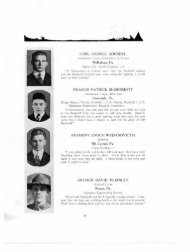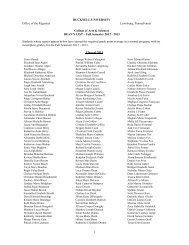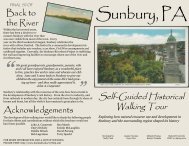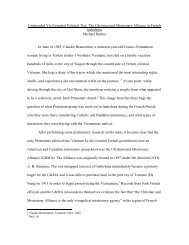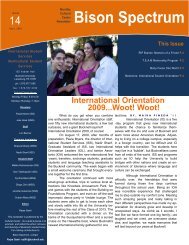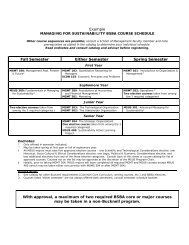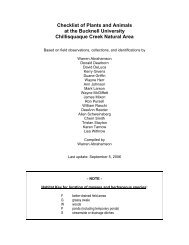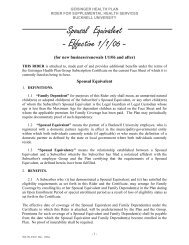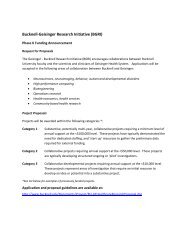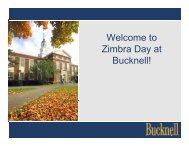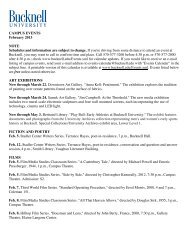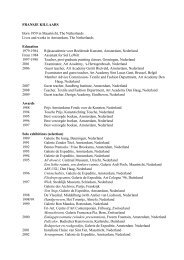DESIGNING A CRAWLER AS AN INTELLIGENT AGENT Jahman N ...
DESIGNING A CRAWLER AS AN INTELLIGENT AGENT Jahman N ...
DESIGNING A CRAWLER AS AN INTELLIGENT AGENT Jahman N ...
Create successful ePaper yourself
Turn your PDF publications into a flip-book with our unique Google optimized e-Paper software.
<strong>DESIGNING</strong> A <strong>CRAWLER</strong> <strong>AS</strong> <strong>AN</strong> <strong>INTELLIGENT</strong> <strong>AGENT</strong><br />
<strong>Jahman</strong> N'Daw<br />
Class of 2007<br />
#C2495<br />
570-577-6577<br />
jndaw@bucknell.edu<br />
123-68-7806<br />
Faculty Advisor: Professor Xiannong Meng, Computer Science<br />
X_______________________<br />
<strong>Jahman</strong> N'Daw<br />
X_______________________<br />
Xiannong Meng
PURPOSE OF THE PROJECT:<br />
The purpose of this project is to design and implement a crawler that will process<br />
relevant information on the web. After its integration to the search engine, the crawler<br />
will provide web users a powerful educational search tool. It will also enable users to<br />
access resourceful educational intranets such as universities and libraries. On the other<br />
hand, it will empower these intranets to establish communications, as well as opening<br />
opportunities for future collaborations among them.<br />
PROJECT DETAILS:<br />
Presently, the biggest advantage for the users of the Internet is the immense<br />
amount of information available on the World Wide Web (www). However, the biggest<br />
drawback is the difficulty of finding relevant information. Search engines provide only a<br />
partial solution to this problem. The enormous amount of information available on the<br />
Web perpetually limits the efficiency, speed and accuracy of search engines. This<br />
limitation is becoming problematic since the information available on the Web is<br />
growing constantly and rapidly at an accelerated rate[1]. There are billions of web pages<br />
with their number increasing at a rate of a million pages per day[2] and 40% of all web<br />
pages changing weekly[3, 4]. Google, for instance, provides a search of over 3 billion<br />
web pages[5] which represents only a part of whole the web. Therefore, it is important to<br />
address the problems of limited efficiency, speed and accuracy. This project is an attempt<br />
to improve information retrieval on the web.<br />
Crawlers are intelligent agents. They are also know as spiders or bots. They are<br />
specialized programs that automatically visit sites and index the web pages by creating<br />
entries in the databases of search engines. They do so by "crawling" through a site a page<br />
at a time, following the links to other pages on the site until all pages have been read[4].<br />
However, maintaining currentness of indices by constant crawling is rapidly becoming<br />
impossible due to the increasing size and dynamic content of the web[6]. The main<br />
reason is that current crawlers can easily wander off the targeted web sites when they<br />
follow hyperlinks.<br />
The challenge of this project is to design and implement a crawler that will stay<br />
focused when crawling. A domain-focused crawler, that is integrated to a search engine,<br />
selectively seeks out pages that are relevant to pre-defined topics[2,3]. Designed as such,<br />
the crawler will no longer target the entire web. It will only crawl sets of hosts that are in<br />
a given domain (e.g. *.edu). It will crawl particular topical sections of the web without<br />
exploring the irrelevant ones[7]. This behavior is called "an intelligent crawling"[8]. A<br />
crawler that is designed to produce efficient, speedy, and accurate information is a major<br />
educational tool for researchers, academicians, and students. Such users will have access<br />
to the potentially rich intranets and will be able to locate wide range of information. In<br />
short, the applicability of the proposed crawler will allow communications and<br />
collaborations between these intranets.
Crawlers are intelligent multi-purpose tools and their range of parameters can be<br />
reconfigured. Certain parameters pertain to the speed at which the crawler downloads<br />
pages. The walking and crawling characteristic of the crawler, the design that allows it to<br />
only go after indexed pages, the schedule of its activity, the domains that it connect to<br />
and the pages that it will accept from a single domain as well as the frequency of its<br />
activity are other attributing parameters of a crawler. The design and implementation of a<br />
crawler which will optimize all these parameters, and improve the speed and efficiency<br />
of the search engine and the accuracy of the search results. The outcome of the proposed<br />
project will be a powerful research tool, that is a domain-focused crawler which will<br />
provide a best user experience.<br />
METHODOLOGY:<br />
This research will take place in Bucknell University during June and July of 2004.<br />
The time table of the project will have two sequences.<br />
During the first two weeks of June, I will complete a research on relevant<br />
information. I will start researching the material after the mid-term examinations of the<br />
Spring semester. I will work closely with Dr. Xiannong Meng everyday of the week and<br />
examine how different implementations of crawlers work for a small set of documents.<br />
The design of the crawler will be selected after analyzing various possibilities. During the<br />
last two weeks of June, Dr. Meng and I will work on specifying all aspects of the selected<br />
design. A precise documentation of the stages of this process will be provided with<br />
precision and details. During this period, we will also consider relevant theoretical<br />
approaches to analyze and minimize possible risks, as well as consider best<br />
methodologies to identify and manage problems, in order to provide a correct algorithm<br />
to implement the crawler[9].<br />
During July, we will be implementing the crawler by transforming the algorithm<br />
into a particular programming language. After completing the implementation processes,<br />
we will test the code, remove all logical errors and design a set of data to test the<br />
crawler's performance. We will refine the crawler in stages: first, by developing a<br />
simplified working program for testing purposes; then, refining the solution adding new<br />
features. The outcome of this strategy will be a well-structured crawler that is integrated<br />
into the search engine and is a useful educational research tool. Our crawler will enable<br />
the search engine to produce accurate information. Resulting efficient, speedy and<br />
accurate access to resourceful intranets will establish communications and collaborations<br />
between numerous intranets creating a "network of networks". Throughout this research,<br />
I will produce summaries of the relevant journal articles, conference papers, white papers<br />
and books. I will discuss my findings with Dr. Meng on regular basis. During the period<br />
of designing the proposed crawler, I will test different algorithms and measure their<br />
performances.<br />
Not only will this multi-sided Summer Research at Bucknell allow me to gain<br />
research experiences, but also is critical for expanding my knowledge on design,<br />
deployment, and performance of web crawlers. All these activities will provide me with<br />
essential experiences and needed knowledge to become an accomplished computer<br />
engineer. I eagerly anticipate having the opportunity to become a research assistant for<br />
this project.
FACULTY ENDORSEMENT:<br />
I am very excited about the prospective that I may have an opportunity to work with<br />
<strong>Jahman</strong> N’Daw in a summer research project about focused web crawler. I have been<br />
working in the area of intelligent web search for a few years. My colleagues and I have<br />
published a number of journal papers, book chapters and conference proceeding papers in<br />
the area. However we often come to a roadblock that we don’t have our own web crawler<br />
to collect information. We had to rely on the information collected by other search<br />
engines in our empirical study. We have been dreaming of having a crawler of our own<br />
that can integrate with the search engines we use in our experiments.<br />
<strong>Jahman</strong> comes at a right time with the right project! I had <strong>Jahman</strong> in my Introduction to<br />
Computer Science II course. Though only a sophomore, he impressed me the most with<br />
his enthusiasm for research in the area of Internet and World Wide Web, his eagerness to<br />
explore the unknowns, and his ability to keep himself focused on the project.<br />
This crawler project will give us the opportunity to experiment with the ideas we have<br />
been thinking about that we couldn’t implement because of the lack of time. We would<br />
like to focus crawling by following only the web servers in a specific domain. When the<br />
crawler is built as proposed, it will allow us to further investigate various web search<br />
issues such as personalized search, clustering the search results, and further, federated<br />
web search. <strong>Jahman</strong> will certainly benefit from the project in various aspects. He will<br />
learn first hand how research is conducted, how to do literature search, how to design and<br />
implement a relatively large software, how to test and verify hypotheses after the<br />
implementation is done, and how to write scientific research papers. I very much look<br />
forward to working with <strong>Jahman</strong> in the coming summer!<br />
REFERENCES:<br />
[1] Jenny Edwards, Kevin McCurley, John Tomlin, "An Adaptive Model for Optimizing<br />
Performance of an Incremental Web Crawler" Proceedings of the 10th International<br />
World Wide Web Conference, Hong Kong, May 2001.<br />
[2] Chakrabarti, S., van der Berg, M., & Dom, B. "Focused crawling: a new approach to<br />
topic-specific Web resource discovery." Proceedings of 8th International World Wide<br />
Web Conference, Toronto, Canada, May, 1999.<br />
[3] Dennis Fetterly, Mark Manasse, Marc Najork, Janet L. Wiener "A large-scale study of<br />
the evolution of Web pages." Proceedings of the 12th International World Wide Web<br />
Conference, Budapest, Hungary, May 2003.<br />
[4] Andrei Z. Broder, Marc Najork, Janet L. Wiener, "Efficient URL Caching for World<br />
Wide Web Crawling." Proceedings of the 12th International World Wide Web<br />
Conference, Budapest, Hungary, May 2003.<br />
[5] The Google Search Engine, http://www.google.com
[6] M. Diligenti, F. Coetzee, S. Lawrence, C. L. Giles, and M. Gori, "Focused crawling<br />
using context graphs." Proceedings of the 9th International World Wide Web<br />
Conference, Amsterdam, The Netherlands, May 2000.<br />
[7] Soumen Chakrabarti, Kunal Punera, Mallela Subramanyam, "Accelerated Focused<br />
Crawling through Online Relevance Feedback " Proceedings of the 11th International<br />
World Wide Web Conference, Honolulu, Hawaii, May 2002.<br />
[8] Charu C. Aggarwal, Fatima Al-Garawi, and Philip S. Yu. "Intelligent crawling on the<br />
World Wide Web with arbitrary predicates." Proceedings of the 10th International World<br />
Wide Web Conference, Hong Kong, May 2001.<br />
[9] Frank M. Carrano, Janet J. Prichard, "Data Abstraction and Problem Solving with<br />
C++, Walls and Mirrors", New York, Addison Wesley, 2002.



